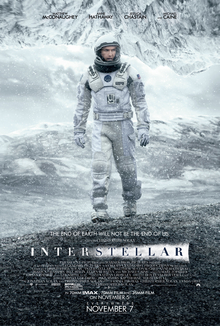I like Christopher Nolan's work. He is a thoughtful director and writer. I actually LIKE Interstellar, HOWEVER, for a film that concentrates so heavily on the science, this one falls through plot holes the size of Gargantua.
First, let's look at the premise which starts our protagonist on his hero's journey. Earth is doomed to run out of food due to a nitrogen loving blight. The last crop is corn. Wars are finished, because people can't feed the armies needed to fight them. Technology is shunned, because we need food not television. NASA has gone underground because of the proliferation of anti-scientific propaganda. The only person who can save us all is a pilot/engineer who has turned to farming because... reasons. Yet, this farmer is the only one who can fix combines which still use a functioning GPS constellation to till the fields between dust storms. SIGH!
Let's start with the idea that technology is bad. At the same time, vehicles are still used, power is still on, and somehow there are satellites in orbit. All of those things require technological infrastructure to build and maintain. Satellites are not autonomous. They require a ground control station. Power generation is also something that requires constant maintenance and control. Vehicles require fuel (There was no way that dual axle truck was electric), and that requires a refinery and petroleum well. All of that has to be maintained by mechanics and engineers, so the farmers can do their job. The idea that everyone needs to become farmers instead of scientists, mathematicians, and engineers has been tried (Cambodia), and it didn't work out so well.
If we were reduced to okra and corn, we would be in horrible shape. Ask the Irish how well an agrarian society that depends on a single crop does if there's a disease that kills plants en mass. It would mean that rice, wheat, beans, fruit trees, root vegetables (onions and carrots), leafy vegetables (cabbage and lettuce), and other edible plants had all died. The animals that relied on all those plants would be dead. All the other inedible which the animals had eaten would be dead. All the insects that had relied on those plants would be dead. All the marine life would also be dead. In other words, we would have died long before corn was the only plant that survived. I can't tell if Mr. Nolan was trying to make a statement about how America loves corn, but it's a terrible crop to grow. Corn depletes nitrogen, uses tons of fertilizer, pesticides, water, and contributes to soil erosion. Almost any other plant would be a better crop.
Suspension of disbelief is required for science fiction. If you can't get past the initial conditions, it makes it more difficult to believe the events which serve to set up the first "pinch" (event that sets up Act 2). Why is leaving Earth a better option than trying to SAVE it. This makes the assumption that another planet will be found which will support life as we know it. Earth is the ONLY planet we have found which can support life.
It's not too hot.
It's not too cold.
It has abundant water.
It has a robust magnetic field.
It has a thick atmosphere.
There is abundant oxygen in the atmosphere.
The Earth is not too large, or too small.
The sun is not too active.
The sun is relatively stable.
The sun is not too large or too small.
This is not to say that the Earth is so unique that it's the only world that supports life.
It is not.
I believe that other planets, similar to Earth, exist. They just aren't as common as people wish they were. With the vast distances between worlds, and the great distances involved, we can NEVER take our home for granted. We are stewards, not owners, lords, or masters of this world. We need to care for what we are given.
Which leads me to my last point.
What makes the characters of the film think they will be able to alter the views of civilization enough to prevent a repeat of the mistakes of the past? What makes the astronauts think they won't take the contamination (blight) with them to another world, and wreck that ecosystem as well? How would you prevent someone from propagating the destructive ideas and policies in a new world? What happens if the only habitable planet you find, already has inhabitants? How do you keep from destroying the place you colonize? None of those fundamental questions, or ethical dilemmas are addressed. You'll have to wait for Act 2.

No comments:
Post a Comment